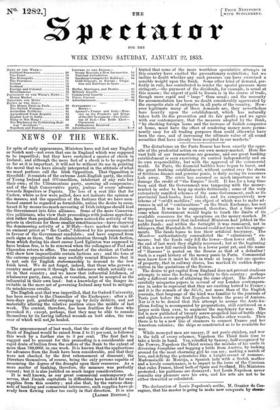The announcement of last week, that the rate of discount
at the Bank of England would be raised from 2 to 24' per cent, is followed this week by a further rise to 3 per cent. The first fact to suggest and to account for this proceeding is a considerable and rapid drain of bullion from the coffers of the Bank to the extent of more than 760,000/. in one week. It is known that the applications for advances from the Bank have been considerable, and that they were not checked by the first enhancement of discount; the Directors themselves, of course, being the only persons capable of measuring the degree of the draught upon their resources. As a mere ,matter of banking, therefore, the measure was perfectly correct; but it is also justified on much larger considerations. It is well known, as our great commercial contemporary ob- serves, that French capitalists in difficulties have looked for easy supplies from this country ;• and also that, by the various chan- nels of banking and commercial intercourse, such supplies have al- ready been flowing rather too easily in that direction. It is also
hinted that some of the more worthless speculative attempts in this country have excited the precautionary restriction ; but we incline to doubt whether any such pressure can have exercised a sensible weight upon the Bank. Some other kind of demand, per- fectly in rule, has contributed to render the special pressure more strhagent,—the payment of the dividends, for example, is usual at this season ; the export of gold to Russia is in the course of trade, though more rapid and " large " than usual ; and the necessity for accommodation has been no doubt considerably aggravated by the energetic state of enterprise in all parts of the country. How- ever legitimate many of these demands are they nevertheless bore heavily upon the establishment, which has naturally taken both its due precaution and its fair profit ; and we agree with our contemporary, that the measure adopted by the Bank, "by checking foreign loans and the increase of foolish companies at home, must have the effect of rendering money naore perma- nently easy for all trading purposes than could otherwise have been the case' and of increasing the ultimate value of all sound securities that have already been accepted in our markets."


































